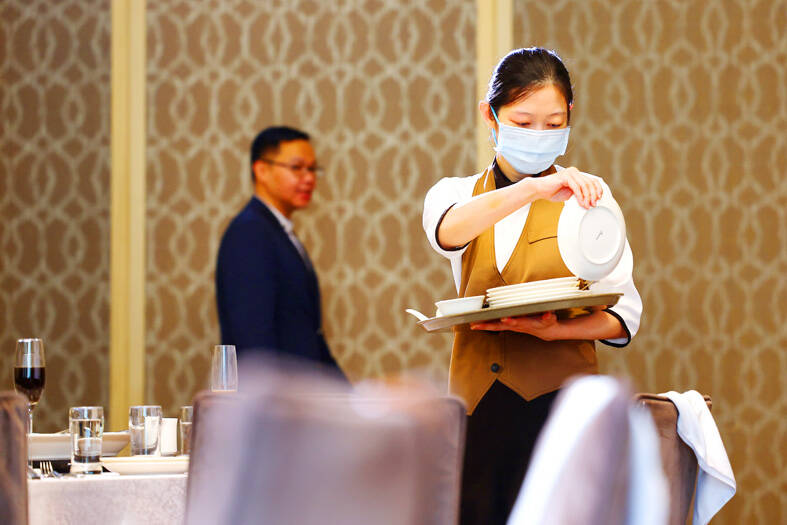The average monthly regular wage in September grew 3.22 percent from a year earlier to NT$46,643 (US$1,446), while the average total monthly wage — including overtime pay, performance-based commissions and bonuses — increased 3.41 percent to NT$56,346, the Directorate-General of Budget, Accounting and Statistics (DGBAS) said yesterday.
Wages improved as local firms adjusted compensation to ease a worker shortage and attract and retain talent, the agency said.
The median wage — a better gauge of typical regular pay as it is not skewed by extremes of high or low wages — stood at NT$37,290, representing an annual increase of 3.28 percent, DGBAS data showed.

Photo: CNA
That closely reflected a report by Academia Sinica’s Institute of Economics, which said the average monthly take-home pay of 80 percent of Taiwanese workers for the past three years was more than NT$30,000.
It also suggested that the monthly wage of the remaining 20 percent was close to the minimum wage of NT$27,470.
The report added that 54.7 percent of local firms raised wages three times during the three-year period and nearly 60 percent adjusted them by 5 percent.
Low pay is widely believed to be a main reason behind the worker shortage and high employee turnover rates at labor-intensive sectors.
Service providers generally have below-par monthly wages, the DGBAS said, citing data in the first nine months of the year.
The monthly wage averaged NT$34,418 at hotels and restaurants, and was slightly higher at other service providers, such as hair salons, at NT$35,766, the agency said.
Monthly regular wages averaged NT$44,187 at manufacturers and a higher NT$55,250 at local suppliers of electronic components, it said.
Hospitality facilities, non-tech manufacturers and construction firms have pressed the government to relax rules governing hiring of migrant workers to address labor problems.
The average regular wage was relatively high at financial and insurance companies at NT$56,403 per month and NT$51,398 at telecom operators and video publishers.
Seeing their business improve significantly this year, financial firms handed out better commissions and performance-based bonuses, the DGBAS said, adding that shipping companies and real-estate brokers likewise experienced a profit bump.
In September, the overall number of workers hired by the service and industrial sectors edged up 0.02 percent, or by 2,000 people, to 8.47 million, while overtime hours slid 0.2 hours from one month earlier, the agency found.
Overtime pay averaged NT$2,255, down 2.68 percent from August, as seasonal businesses linked to the summer was over. Furthermore, some manufacturers cut capacity to save on operating costs.

ENDEAVOR MANTA: The ship is programmed to automatically return to its designated home port and would self-destruct if seized by another party The Endeavor Manta, Taiwan’s first military-specification uncrewed surface vehicle (USV) tailor-made to operate in the Taiwan Strait in a bid to bolster the nation’s asymmetric combat capabilities made its first appearance at Kaohsiung’s Singda Harbor yesterday. Taking inspiration from Ukraine’s navy, which is using USVs to force Russia’s Black Sea fleet to take shelter within its own ports, CSBC Taiwan (台灣國際造船) established a research and development unit on USVs last year, CSBC chairman Huang Cheng-hung (黃正弘) said. With the exception of the satellite guidance system and the outboard motors — which were purchased from foreign companies that were not affiliated with Chinese-funded

PERMIT REVOKED: The influencer at a news conference said the National Immigration Agency was infringing on human rights and persecuting Chinese spouses Chinese influencer “Yaya in Taiwan” (亞亞在台灣) yesterday evening voluntarily left Taiwan, despite saying yesterday morning that she had “no intention” of leaving after her residence permit was revoked over her comments on Taiwan being “unified” with China by military force. The Ministry of the Interior yesterday had said that it could forcibly deport the influencer at midnight, but was considering taking a more flexible approach and beginning procedures this morning. The influencer, whose given name is Liu Zhenya (劉振亞), departed on a 8:45pm flight from Taipei International Airport (Songshan airport) to Fuzhou, China. Liu held a news conference at the airport at 7pm,

Authorities yesterday elaborated on the rules governing Employment Gold Cards after a US cardholder was barred from entering Taiwan for six years after working without a permit during a 2023 visit. American YouTuber LeLe Farley was barred after already being approved for an Employment Gold Card, he said in a video published on his channel on Saturday. Farley, who has more than 420,000 subscribers on his YouTube channel, was approved for his Gold Card last month, but was told at a check-in counter at the Los Angeles International Airport that he could not enter Taiwan. That was because he previously participated in two

SECURITY RISK: If there is a conflict between China and Taiwan, ‘there would likely be significant consequences to global economic and security interests,’ it said China remains the top military and cyber threat to the US and continues to make progress on capabilities to seize Taiwan, a report by US intelligence agencies said on Tuesday. The report provides an overview of the “collective insights” of top US intelligence agencies about the security threats to the US posed by foreign nations and criminal organizations. In its Annual Threat Assessment, the agencies divided threats facing the US into two broad categories, “nonstate transnational criminals and terrorists” and “major state actors,” with China, Russia, Iran and North Korea named. Of those countries, “China presents the most comprehensive and robust military threat